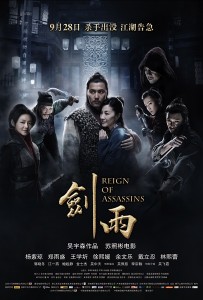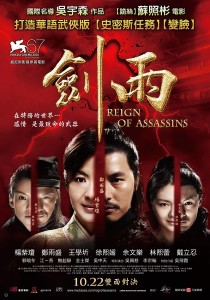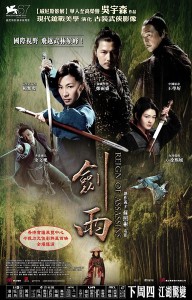Reign of Assassins
剑雨
Hong Kong/China/Taiwan, 2010, colour, 2.35:1, 118 mins.
Directors: Su Zhaobin 苏照彬, Wu Yusen 吴宇森 [John Woo].
Rating: 9/10.
A tip-top cast, well-crafted script and punchy action capture the classic essence of the swordplay genre.
China, early Ming dynasty. Some 800 or so years after the death of Buddhist monk-cum-legendary martial artist Bodhi, his long-lost remains are still sought after, as their owner will supposedly gain limitless power and rule over the martial arts world. Members of The Dark Stone secret guild of assassins hear that imperial minister Zhang Haiduan has half of Bodhi’s remains and go to kill him; afterwards, one of the assassins, invincible swordswoman Drizzle (Lin Xilei), makes off with the remains, en route killing Zhang Haiduan’s son, Zhang Renfeng (Guo Xiaodong). The Wheel King (Wang Xueqi), head of The Dark Stone, puts a price of 50,000 taels of gold on Drizzle’s head. She leaves Shanxi province, and trains with Buddhist monk Wisdom (Li Zonghan),  whose advice convinces her to quit the martial arts world. After depositing her half of Bodhi’s remains in Yunhe Temple, where she gets further advice from aged monk Delusion, she pays renowned doctor Li (Jin Shijie) to change her face, so she can begin a new life. Some time later, under the name Zeng Jing, she moves to the capital and opens a small fabrics stall, eventually marrying Jiang Asheng (Jeong U-seong), a professional courier. But The Wheel King is still hunting her, along with his top assassins Lei Bin (Yu Wenle), The Magician (Dai Liren) and his personally-trained replacement for Drizzle, Turquoise Ye (Xu Xiyuan). Meanwhile, someone has been murdering people in the capital, and members of the Kongdong Sect, which is reputed to have the other half of Bodhi’s remains, are due to arrive to sell them to Zhang Dajing, the crippled
whose advice convinces her to quit the martial arts world. After depositing her half of Bodhi’s remains in Yunhe Temple, where she gets further advice from aged monk Delusion, she pays renowned doctor Li (Jin Shijie) to change her face, so she can begin a new life. Some time later, under the name Zeng Jing, she moves to the capital and opens a small fabrics stall, eventually marrying Jiang Asheng (Jeong U-seong), a professional courier. But The Wheel King is still hunting her, along with his top assassins Lei Bin (Yu Wenle), The Magician (Dai Liren) and his personally-trained replacement for Drizzle, Turquoise Ye (Xu Xiyuan). Meanwhile, someone has been murdering people in the capital, and members of the Kongdong Sect, which is reputed to have the other half of Bodhi’s remains, are due to arrive to sell them to Zhang Dajing, the crippled  head of United Bank.
head of United Bank.
REVIEW
It’s been a long time since a movie has captured the essence of the costume martial arts genre as well as Reign of Assassins 剑雨. Without heavy resort to visual effects, and without going too far down any one stylistic road, the film gives new life to a genre that’s been pulled every which way in the past 20 years in search of new thrills. The biggest compliment that can be paid to the movie is that it’s just like opening and reading a classic swordplay novel, but also seems absolutely of its era and with its own identity, with no sense of being a retro-flavoured tribute.
Taiwan director Su Zhaobin 苏照彬, who made the cheeky comedy Better Than Sex 爱情灵药 (2001) before tripping up with sci-fi thriller Silk 诡丝 (2006), is at heart a scriptwriter (The Cabbie 运转手之恋, 2000; Double Vision 双瞳, 2002), and it’s here that Reign of Assassins scores. Apart from obviously knowing and loving his swordplay novels, Su has invested his characters with a depth that recalls classic scripts like those of the late Hu Jinquan 胡金铨 [King Hu] (especially Dragon Gate Inn 龙门客栈, 1967, and A Touch of Zen 侠女, 1970), finding time for charming asides and small details; and the movie’s Swiss Clock construction, as all the elements finally click into place, is dramatically satisfying rather than just grandstanding its cleverness. Aside from a generally dark, saturated look to the colours, and a habit of shooting the action in medium close-up, Su shows no notable directing quirks: everything is at the service of the characters, actors and script, with the editing by Hong Kong’s Zhang Jiahui 张嘉辉 [Cheung Ka-fai] making sure the viewer knows exactly where everyone is whenever the cork pops off the bottle.
With such a well-chosen cast, the movie gradually starts to bloom once the basic set-up – female assassin seeks a new life by surgically changing her face – is dealt with in the opening 20 minutes. Su’s script spends a relatively long time detailing the slow-burning romance between the swordswoman of action star Yang Ziqiong 杨紫琼 [Michelle Yeoh] and the professional messenger of South Korea’s Jeong U-seong 정우성 | 郑雨盛; but in dramatic terms this pays off later, as their seemingly simple domesticity is interrupted by assassins from her past. With such a rich gallery of characters – from the gaspy-voiced super-villain of Mainland veteran Wang Xueqi 王学圻 to the trashy psychopath of Taiwan actress Xu Xiyuan 徐熙媛 [Barbie Hsu] – the movie works first and foremost as a drama, with the martial arts adding extra value rather than substituting for thin characterisation. Though she’s only on screen for the first 15 minutes, Taiwan’s Lin Xilei 林熙蕾 – apart from making a perfect facial precursor for Yang – makes one regret more directors haven’t cast her in martial arts movies; she’s one of the most believably ruthless swordswomen since Ma Hailun 马海伦 [Helen Ma, in The Deaf and Mute Swordswoman 聋哑剑, 1971].
Su makes good use of Yang’s cool elegance in a part that’s tailor-made for the Malaysian Chinese star, and the obvious 10-year age difference between her and younger co-star Jeong (The Good The Bad The Weird 좋은 놈, 나쁜 놈, 이상한 놈, 2008; A Good Rain Knows 호우 시절 | 好雨时节, 2009) actually works as a distraction from one of the twists. It’s one of several cheeky touches throughout the movie, which has fun not only with Xu’s wonderfully slutty swordswoman and the magician-assassin of Taiwan’s Dai Liren [Leon Dai] 戴立忍 but also completely pulls the carpet from under the audience when the real motivation of Wang’s super-villain is revealed. Though some of this may seem over-the-top to western audiences, it’s all thoroughly in tune with the fantastical element of classic swordplay literature.
Production design (and costumes by Japan’s Wada Emi 和田惠美) find a middle path between the current trend of grungy realism and the more laundered look of classic movies from the 1960s and 1970s, with the balance tipping slightly towards the latter. Action by Hong Kong’s Dong Wei 董玮 makes heavy use of just-okay wire work and slow motion in long shots, and packs more punch in the close-up sparring and weapon work. The symphonic score by Jin Peida 金培达 [Peter Kam] is well above his norm here, partnering Su’s direction and Zhang’s cutting at all times, from rainy romance to nocturnal shenanigans. (Reflecting its Chinese title, “Sword(s) and Rain”, the film makes frequent use of both.)
Producer Wu Yusen 吴宇森 [John Woo] was reportedly on set the whole time, offering advice to Su, though there’s no real trace of a Wu “signature” in the film. The Chinese end credits read “a film by” Wu, “directed and written by” Su. The official English credits read “directed by” Su, “co-directed by” Wu.
*
The 119-minute version released in China features drastically different editing in its first 15 minutes, cross-cutting between several periods and showing actress Yang Ziqiong [Michelle Yeoh] on screen at the start as Zeng Jing arrives in the capital. The film then flashbacks to her past as Drizzle, yoyo-ing between her time with Buddhist monk Wisdom and her subsequent face operation. The opening 15 minutes in the international version (shown at Venice, and reviewed above) are strictly linear, with actress Yang not seen until after her character’s operation.
CREDITS
Presented by Beijing Galloping Horse Film & TV (CN), Media Asia Films (HK), Zhejiang Dongyang Dragon Entertainment Venture Investment (CN), Gamania Digital Entertainment (TW), Lumiere Motion Picture (TW), Beijing Heguchuan TV & Film (CN). Produced by Lion Rock Productions (HK).
Script: Su Zhaobin. Photography: Huang Yongheng [Horace Wong]. Editing: Zhang Jiahui [Cheung Ka-fai]. Music: Jin Peida [Peter Kam]. Production design: Yang Baigui, Su Guohao [Simon So]. Costume design: Wada Emi. Action: Dong Wei. Sound: Wei He. Visual effects: Du Jiaju, Ren Yu. Post-production supervision: Lin An’er [Angie Lam].
Cast: Yang Ziqiong [Michelle Yeoh] (Zeng Jing), Jeong U-seong (Jiang Asheng), Wang Xueqi (Cao Feng/The Wheel King), Xu Xiyuan [Barbie Hsu] (Ye Zhanqing/Turquoise), Yu Wenle [Shawn Yue] (Lei Bin), Lin Xilei (Xiyu/Drizzle), Guo Xiaodong (Zhang Renfeng), Jiang Yiyan (Tian Qingtong), Dai Liren [Leon Dai] (Lian Sheng/The Magician), Bao Qijing [Paw Hee-ching] (Auntie Cai), Wu Zhongtian [Matt Wu] (Killer Bear), Jin Shijie (Li, doctor), Wu Peici (Kongdong Green Sword), Li Zonghan (Lu Zhu/Wisdom), Wu Feixia [Angeles Woo] (Eater Bear), You Benchang (abbot), Tong Lei (father-in-law).
Premiere: Venice Film Festival (out of competition), 3 Sep 2010.
Release: China, 28 Sep 2010; Hong Kong, 7 Oct 2010; Taiwan, 22 Oct 2010.
(Review originally published on Film Business Asia, 3 Sep 2010.)
